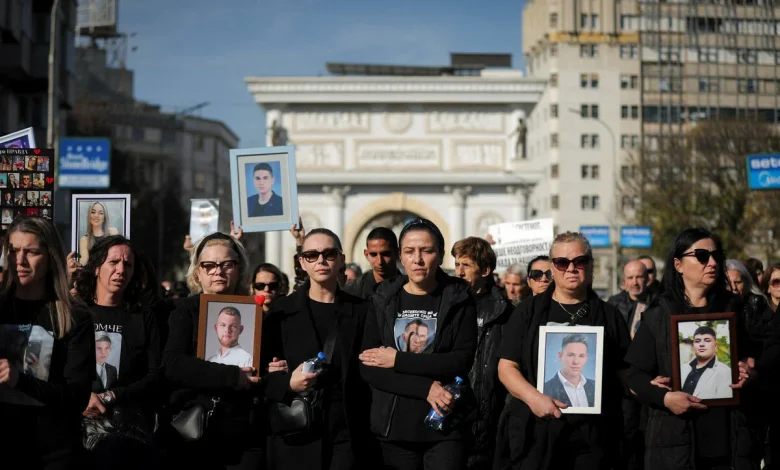Tragedy in Kočani – victims of the “Puls” discotheque seek justice

19.11.2025. 07:43h
This Wednesday, November 19, the most important trial in North Macedonia begins. The families of the 63 victims of the fire in the Kočani discotheque “Puls” expect justice for the loss of their loved ones and for the pain caused to the injured and all those affected by the tragic event. It has been announced that two hearings will be held per week in order to ensure a timely and high-quality conclusion to the trial. There will be 38 defendants in the dock, namely 35 individuals and three companies, and 15 prosecutors will be opposing them. The trial will be held in a digital courtroom within the premises of the “Idrizovo” correctional facility, which is claimed to have the spatial capacity and technical capabilities for such a complex trial. The judge in this trial will be Dijana Gruevska Ilievska.
Retired judge Gordana Spiroska, who tried several “hot” criminal cases from the former Socialist Republic of Macedonia, says that since the day of the tragedy, she has been following with great attention the involvement of investigative and judicial authorities and the formulation of the indictment.
“I would not like to be in the position of the judge who will try this difficult and complex case. I know the judge, she is an excellent professional, but I know it will be difficult for her. This is the most difficult case to try after the trial on April 27,” Spiroska told DW (trial for the break-in into the Macedonian parliament on April 27, 2017). She also emphasized that she believes in the court, that it is well prepared in all aspects and that justice will be served.
Media reports remind that Judge Gruevska-Ilievska has 19 years of experience in such cases, including those against former Prime Ministers Vlado Buckovski and Zoran Zaev, and was also on the trial panel in the “Titanic” trial, when part of the VMRO-DPMNE leadership was on trial. She also presided over the panel that tried the serious passenger bus accident near Laskarec in 2019, when 16 people died and 37 were injured.
photo: Shutterstock
Will there be justice?
However, as DW’s interlocutors say, this trial is incomparable to any other, because the accident was caused primarily by a failure of the state apparatus, and therefore the trial could also cause political upheaval. Some believe that there were flaws in the process even before it reached the trial stage.
“The Kočani case has been removed from the Criminal Code and all laws regulating this matter. The system itself evolves and develops through amendments to the law. That’s why I find it incomprehensible how a minister or a responsible person from 10 years ago can be held accountable for a criminal act that happened now. This was not done by accident,” Tuše Gošev, a former justice minister and now a lawyer with decades of experience, tells DW.
Gošev believes that the proceedings are being conducted incorrectly and that their goal is to expand responsibility and reach an epilogue in which everyone will be held responsible and no one will be punished.
“The proceedings, including those for compensation to the families, may take up to 20 years, and in the end the question will be who will bear all the costs after the families file a lawsuit for compensation for non-pecuniary or material damage, and who will compensate for the damage that will now occur. Damage has already occurred because no one knows, in accordance with Art. 25 of the Criminal Code, who should be held responsible for intent and how each individual’s contribution to the accident will be determined,” he pointed out.
photo: REUTERS
Thousands of pieces of evidence on the table
Former Minister of Internal Affairs, now a lawyer and president of the Bar Association, Ljubomir Mihajlovski, told the media that it would be “a challenge” to conduct a relatively quick procedure, without delays, without compromising the quality of the trial. “Because all the shortcomings that occur during the first procedure cause a longer trial, there will be appeals, the case is sent back. So all participants must help to ensure a fair procedure in which the arguments of the defense and the prosecution will collide,” he said.
Mihajlovski pointed out that there will be thousands of pieces of evidence on the table. “There is a lot of evidence that has been proposed by both the prosecution and the defense. I am talking about thousands of pieces of evidence. This evidence needs to be presented before the court in a lawful procedure, to be explained, to be presented as to what each piece of evidence is for, what it proves, so that both citizens and injured parties must be patient,” he said.
Judge Spiroska also emphasizes that the trial is testing the entire judicial system and that the most difficult task for prosecutors will be to prove guilt. “Although there are a large number of defendants, that does not mean that it will be difficult to reach a verdict. Each of the defendants has specific and measurable responsibility, so this will not be a difficult moment in the entire trial,” Spiroska told DW.
Ahead of the start of the trial, the prevailing opinion is that the Macedonian judiciary is being put to the test and that future generations will learn from the trial for the Kočani tragedy. The trial is also important for the overall atmosphere in the country, because justice for the victims and their families is imperative in order to restore lost faith in the state, but also to reconstruct the case and determine where the institutions failed. In this regard, Prime Minister Mickoski indicated on Monday (17.11.) that the trial will provide the necessary answers.
News




